I decided to document my experience with Wegovy semaglutide, Wegovy is the brand that I have been taking for the past 6 plus months. The medication semaglutide is also found under the medication name of Ozempic. The dosing is different but these are the same medication, which is semaglutide.
First of all, let me start by saying that I am not a medical professional and this post is not intended to give any medical advice. This is my personal experience taking semaglutide and everyone’s experience with it can be different, If you have questions about it, please talk to your doctor or health care provider.
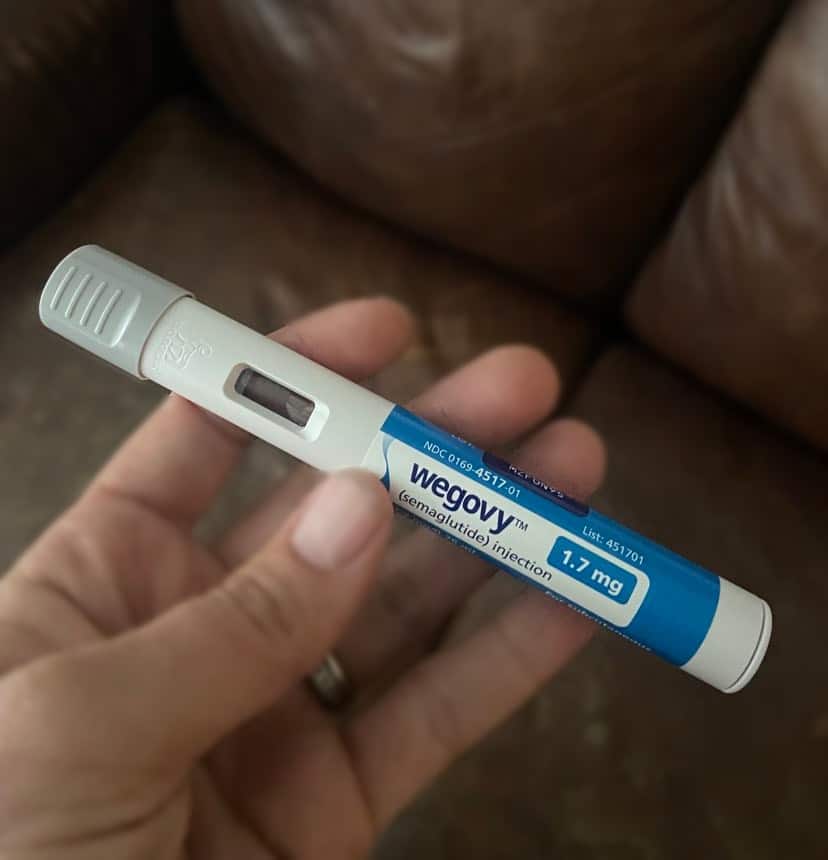
What is semaglutide?
Semaglutide is a hormone that is naturally found in the intestines. The use of semaglutide in a pharmaceutical sense was originally tested and developed for use in treatment of type 2 diabetes. It is manufactured in the form of Ozempic for this use.
After this development, Wegovy was developed to get FDA approval for weight loss. The dosing in Ozempic is lower and meant to work along side other medications to manage type 2 diabetes. Wegovy’s dosing is much higher and meant for people with a BMI (Body Mass Index) of 35 or over. Both brands do the same thing but in different doses and intended for different treatment plans.
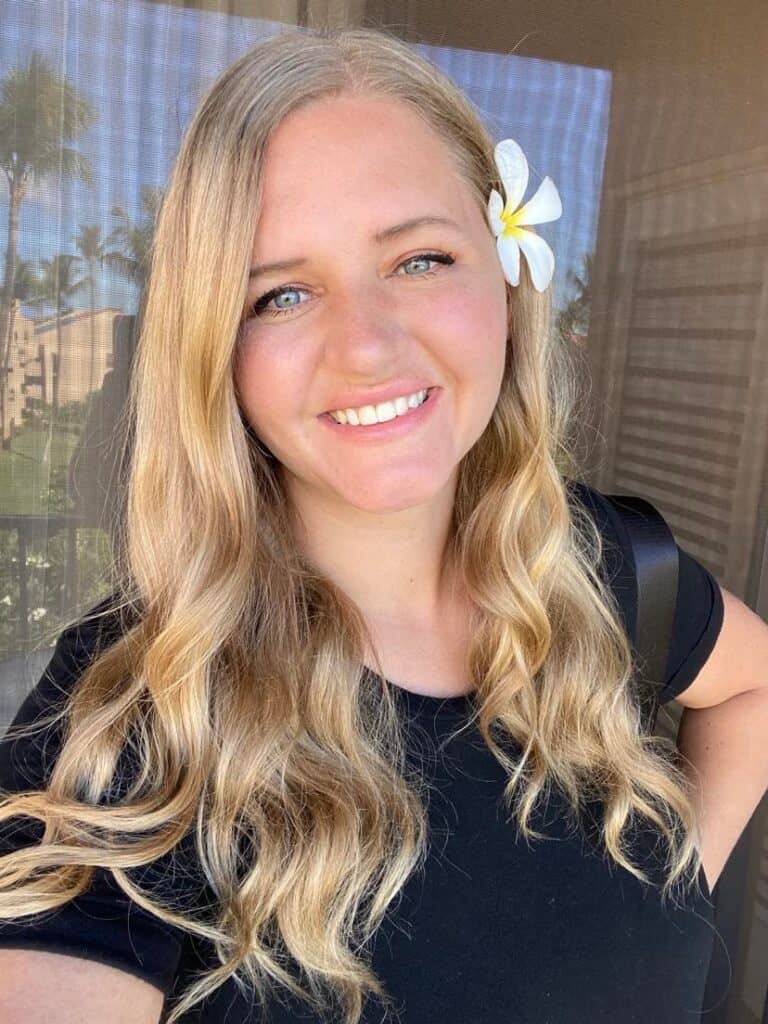
How does it work?
This drug works in two main ways and without getting too technical (Here is the link to PUBMED with studies and articles all about semaglutide to provide more technical explanations of the drug and how it works).
The first way this drug works is the GLP-1 (glucagon-like peptide 1) receptors. The drug is what you would call a GLP-1 receptor drug. I am going to refer to them as G1 receptors in this post. In the gut we have G1 receptors that send signals to the brain when we are satiated or full after a meal. We naturally have semaglutide in our guts, however, by taking this drug we increase the amount in our systems which makes our gut send signals to the brain quicker and more efficiently saying that we are full faster. Semaglutide directly impacts the rate that the stomach empties and slows digestion.
This receptor is particularly receptive to proteins that we have eaten. So while taking semaglutide, you will notice that you are full quicker with high protein and high fat foods than you are from carbohydrates or foods with higher water content.
The G1 receptors slow the rate that the stomach drains dramatically and I like to refer to this as if it were chemical gastric bypass because that is what it feels like at times. Sometimes you can only take a bite or two and you are full, especially with high protein and high fat foods. That full feeling will also last much longer than without the drug. This full feeling isn’t something you can easily push past, I physically could not eat any more at times and found it hard to even swallow if I felt full. This also does increase gastrointestinal issues but I will talk about that below under side effects.
I have also noticed that my body had a cap of about 200-250 calories per meal I eat, no matter what the meal is. This full feeling doesn’t seem to be related to the mass or bulk that is consumed but instead is more calorie specific concentrated. I can eat a whole salad but only take a few bites of a hamburger because those receptors know that is being consumed nutritionally and send the appropriate signals for it. I have heard it referred to as a barrier and some foods pass this barrier easier.
The second way this drug works is it binds with an enzyme that is released from the liver to store excess glucose that is left in the blood after cells have tried to use it for energy, so leftover glucose gets stored as fat for energy later. When semaglutide binds with this enzyme the normal storage cannot take place and the excess glucose is flushed out through the urine. Note that I am trying to explain this process as simple as possible but it is actually a highly complicated process and again I am not a medical professional.
As someone with Poly Cystic Ovarian Syndrome (PCOS), often called diabetes of the ovaries, this aspect of the drug is especially beneficial. One of the main roots of PCOS is insulin resistance. This comes from an excess production of insulin released from the pancreas.
I have heard the pancreas releasing insulin as a “leaky faucet” before. Because of this, the cells get an over exposure to this insulin quickly and that causes the cells inability to open and use glucose properly as energy. Therefore, it gets stored as fat, especially around the middle stomach area, shoulders, arms and back. This increased insulin release also effects the ovaries by telling them to produce more testosterone and that is a key defining factor in diagnosing PCOS and what cause so many of the symptoms and issues related to PCOS.
In case you are curious about PCOS; to be diagnosed with it you have to have 2 of the 3 symptoms. 1 – elevated testosterone levels, 2 – irregular periods (too long between them or too short). 3 – cysts on the ovaries. There are also other telltale symptoms of PCOS in lab work. High cholesterol and high triglycerides. These indicate that glucose is not being processed correctly.
The overall effect of semaglutide on lab work is that is lowers cholesterol, lowers triglycerides, lowers A1c levels and lowers BMI (body mass index).
Why did I start taking Semaglutide?
I will condense my story for the sake of talking about the medication but here is an overview. I have worked to manage my PCOS (poly cystic ovarian syndrome, also referred to as diabetes of the ovaries) since I was in my early 20’s and it’s been quite the learning process and journey.
I got married and a year later got pregnant with twins, unfortunately something in the pregnancy was not right and I miscarried them at 11 weeks along. After miscarrying I rapidly gained weight, I put on around 80 pounds in a year without many dietary changes and I could not get pregnant again.
I read about PCOS and figured that I had it but honestly knew nothing about it, other than I needed to manage my blood sugar. I began working out again, (I was a competitive athlete for most of my life) and eating healthier, carbohydrate conscious foods and I was able to get my period back and became pregnant with my first daughter. I still had no diagnosis of PCOS by a medical professional but just suspected that I had it and could manage it on my own.
I was able to loose a lot of weight after having my daughter because I was watching my blood sugar, working out and eating healthy. 2 years later I had my son and after having him, I lost 65 pounds in 6 months and became pregnant with my third son after just a year post partum. I then lost 45 pounds after having him and was able to conceive my 4th and final daughter about 2 years later.
I figured if I was able to get pregnant then I was managing the PCOS and I didn’t need to worry about anything else. I didn’t fully understand the effect that PCOS has on overall health because it seemed to be so focused on fertility at that stage of life. However, I was done having kids and the other symptoms were about to come full focus.
The year I turned 30, I got an ingrown toenail and it would not heal, no matter what I did. The infection had spread into my bone and I finally went into the doctor’s office thinking that maybe my thyroid was not working properly. He did some lab work and found that I was prediabetic and my lab work was a mess.
This came as a total shock to me because I was hardly eating any carbohydrates and I was working out intensely every day. I felt like I was in good shape, so to see bad blood work was really scary.
I took those labs to my general doctor and brought up that knew I had PCOS and now I had the labs that showed it. She diagnosed me formally with PCOS and my self guided research began.
I learned about supplements that could help me mange my insulin resistance. I started taking berberine, myo-inisitiol and d-chiro inisitol. My blood sugar A1c levels dropped by .5 and I was in the normal range.
I later went vegan to manage my insulin sensitivity but I gained weight and started loosing hair and muscle strength from malnourishment.
I learned that my body wasn’t synthesizing vitamin D and that I needed much more than the average person. I started taking prescription large amounts of vitamin D, vitamin B complex, fish oil, flaxseed oil, spearmint capsules (lowers testosterone), coQ10, zinc, l-carnitine, and probiotics and with these I was able to manage my PCOS, weight gain and A1c blood sugar levels for a few years, along with a lower carbohydrate diet and regular rigorous exercise.
The year I turned 34, I felt like my approach wasn’t drastic enough because I was gaining weight and my labs were still bad despite my already extreme effort. So I went keto, determined to just work harder to mange this and keep my keto a “healthy” keto by getting fats from olive oil, MCT coconut oil, avocados and lower saturated fat foods and I kept my calories in a healthy range, tracking every bite. I did this for 6 months and I lost 20 pounds; most of that was water weight at the beginning of the diet and then I plateaued.

I felt pretty defeated that even with that extreme effort I was still plateaued in weight loss. I met with a physician assistant for my annual appointment and I asked her to put me on metformin because I was not eating carbohydrates, exercising and my a1c’s were just barely within normal range. She snapped at me that metformin was not for weight loss even though I never mentioned taking it for weightless specifically and she would not prescribe it to me, even with my diagnosis of PCOS and history of blood sugar issues and insulin resistance.
This should have been my sign to go to a different doctor, someone who would not make me feel awful and shamed for asking for help and someone who knew about PCOS. However, I felt broken and this response made me shut down. I stopped doing keto, rapidly gained back every pound and more within a few weeks.
I was a completive athlete when I was younger and I have always been a hard worker. I would swim hard workouts for 4 hours a day some training days growing up and have no lack of discipline with it comes to putting in hard physical work. I also hate to admit when I am struggling and hate excuses for myself (that inner competitive athlete comes out) so I thought I will just work harder. I started swimming a mile and a half in an hour every day and then walking as much as I could during the day. I cut my calories down to about 1200 to 1500 a day and was determine to beat the PCOS through shear will power and hard work.
Well, that didn’t work, I was rapidly gaining weight. I gained 30 pounds in 7 months despite my efforts. I could literally see the weight gain happening over night on my arms. I felt completely helpless, What more could I do to defeat this?!?! I wanted to give up but then I would just be worse off in the end when I came back to my senses. Frustrated is a massive understatement.
The annual insurance health testing came up for my husband’s work and my cholesterol was super high, my triglycerides were insane but thanks to my supplements my a1c was .1 away from being prediabetic. I hadn’t had my period in months either and everything was just off.
I decided to swallow my pride and talk to another doctor. To my surprise he was so helpful and wanted me to succeed at managing my labs and weight! Halleluiah!
I had seen a PCOS instagrammer talk about her experience with semaglutide, I had never heard of it before and I was so excited that there was an option for people like me! My doctor put me on metformin and prescribed me semaglutide, Wegovy, because I had an elevated BMI and my a1c blood sugar levels were still “normal” because of the supplements I was taking to keep them low and the exercise I was doing daily.
Because of this my doctor didn’t feel I would qualify to take Ozempic for type 2 diabetes from an insurance point of view. He figured I would have a better chance of getting insurance to approve Wegovy vs. Ozempic. Please note that I know many people who get approved for Ozempic solely based on the PCOS diagnosis.
Insurance Approval
My insurance immediately denied coverage of medication. I resubmitted with PCOS as a reason for taking it, again they denied it. I then set up an appeal through an appeal board. I met with them to plead my case and they didn’t feel like I had done everything I could before resorting to semaglutide.
They wanted me on 2,000 milligrams of metformin a day for months before they would even consider it and even then it was no guarantee. The bottom line was they were not going to pay out for a medication that would help weight loss, even though the weight loss was a symptom of unmanaged insulin resistance and this would be helped by the medication.
I had heard through others that my insurance was also denying others of any sort of injectable medication despite the medical necessity. So I decided that I would just pay out of pocket to see if this medication would help me.
I received a pharmaceutical coupon for the medication that made it $827 a month vs. ~$1500 a month. Ouch is all I can say! That is a lot of money to pay a month. Honestly it’s close to my mortgage payment. However, I chose to make an investment on my health because like I said, I was desperate. I felt like I could have a stroke or have complications from diabetes before I was 40 and that was a key motivator for paying out of pocket for me.
My Wegovy Journal.
I decided to keep a journal of the whole process so I could help others going through the same experience and I wrote down tips and things I found helpful as well.
Weight loss results through the first 6 months.
I started with a BMI of 36 and after 6 months on semaglutide my BMI was 27.7.
My goal with this medication is to get to a BMI of below 25 so I will be in the healthy BMI range, for me that is about 20 more pounds.
This equals out to losing 58 pounds in 6 months with an average of 8-12 pounds per month. This has been consistent and not water weight but real inches and real weight lost. I tend to hold water a lot with my PCOS and certain diets I have done in the past just flush out water weight, however, this medication does not seem to do that significantly.
Here is a picture timeline through this process.
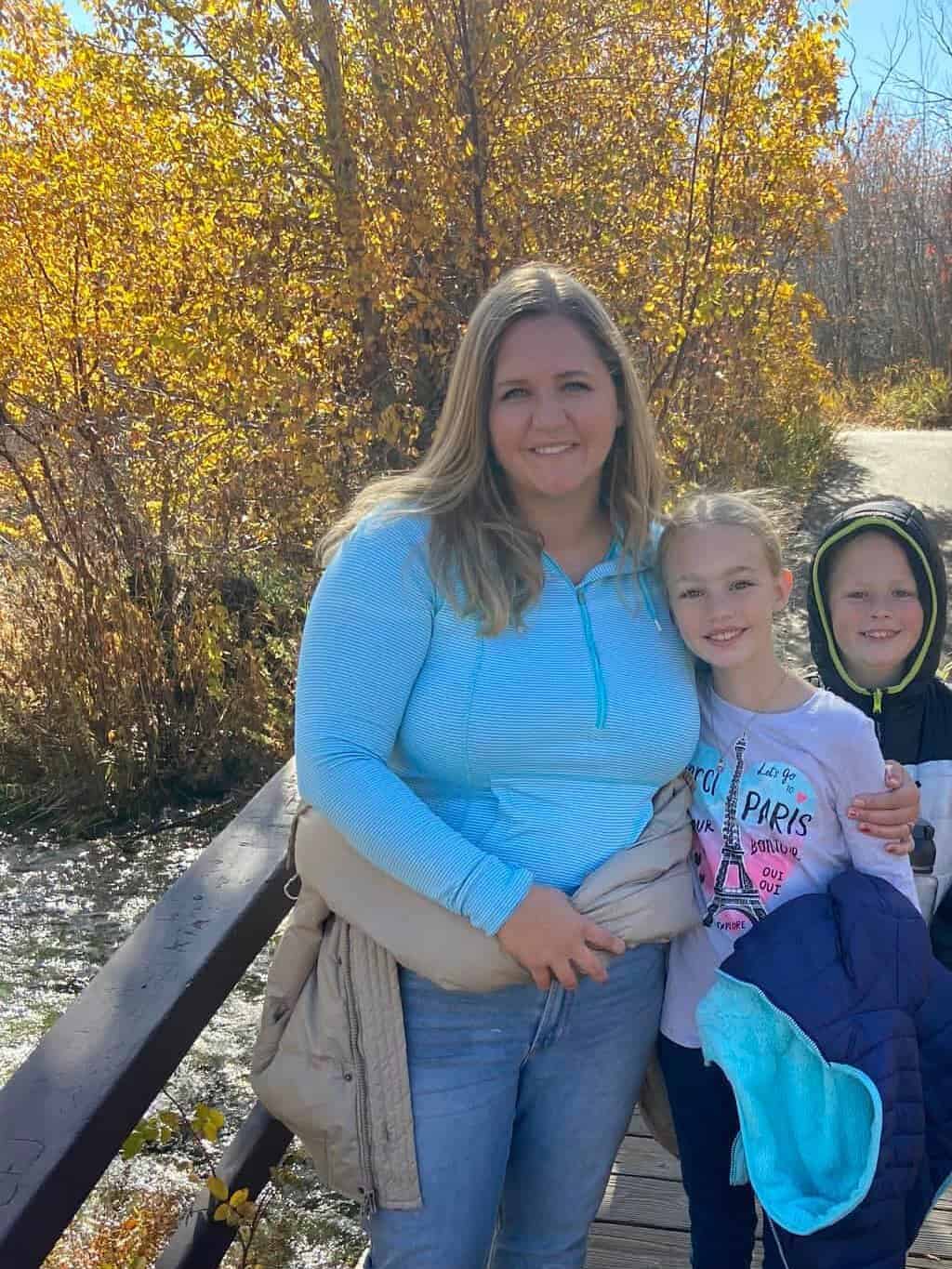








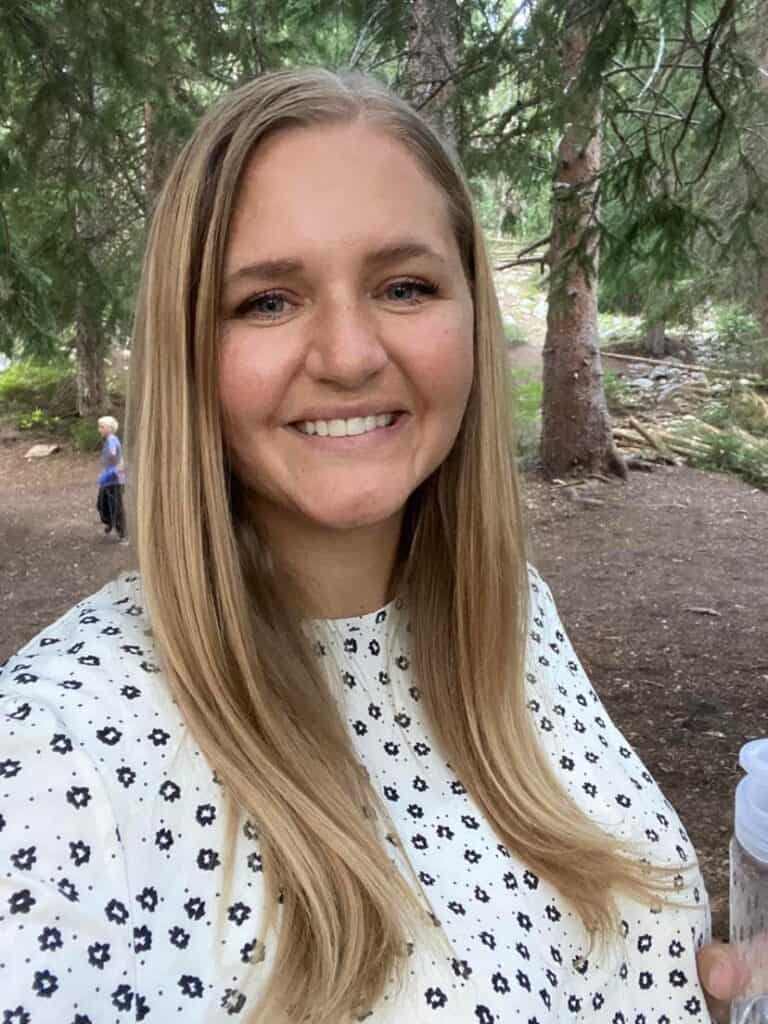
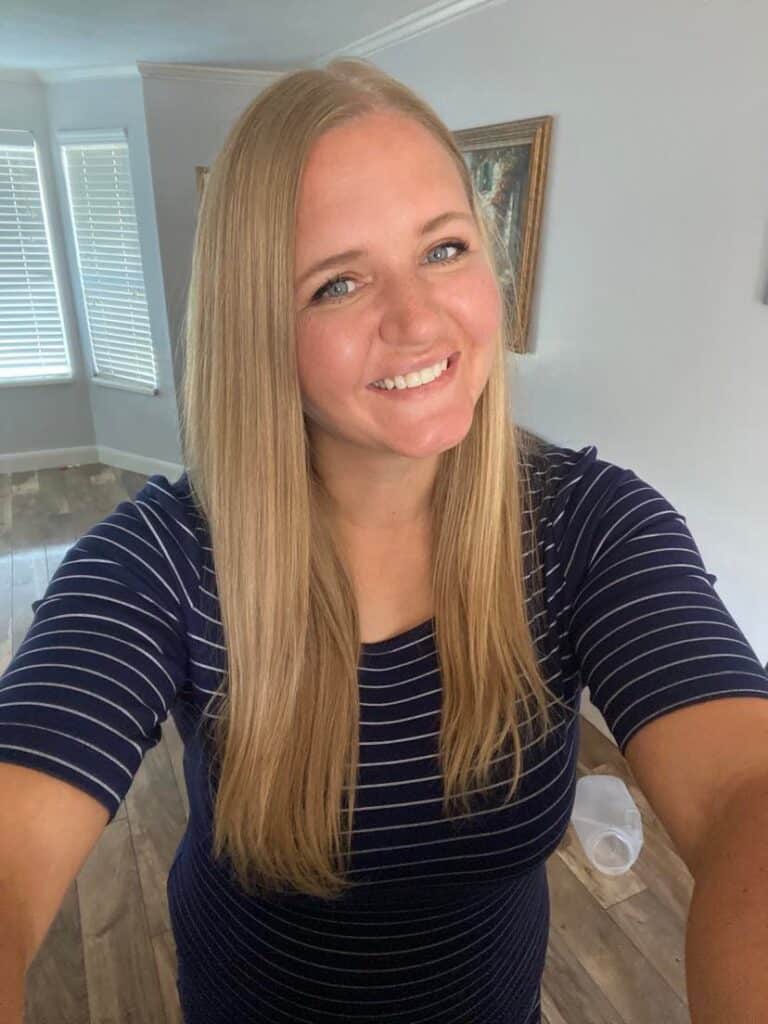
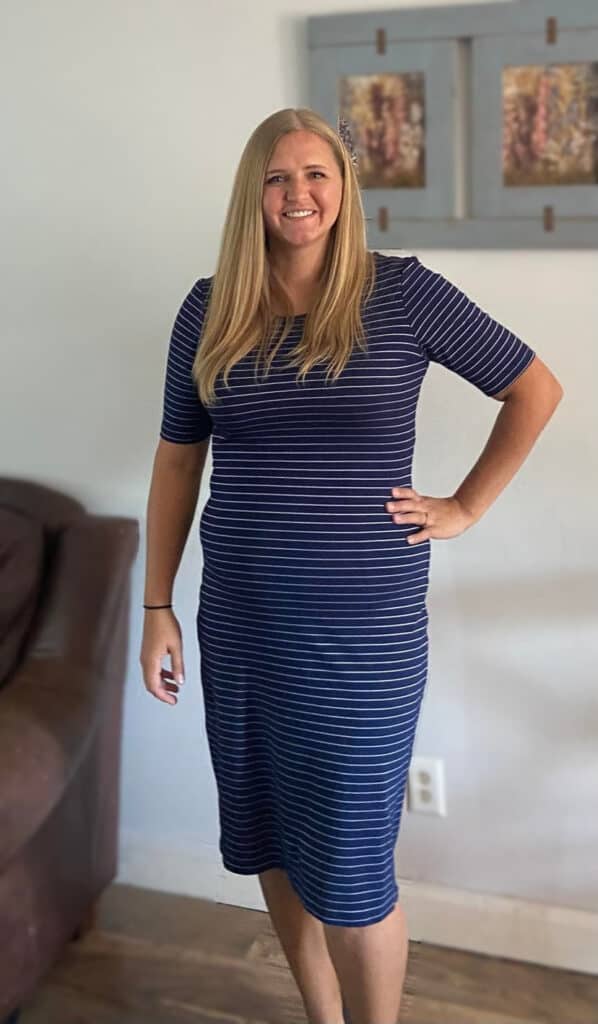
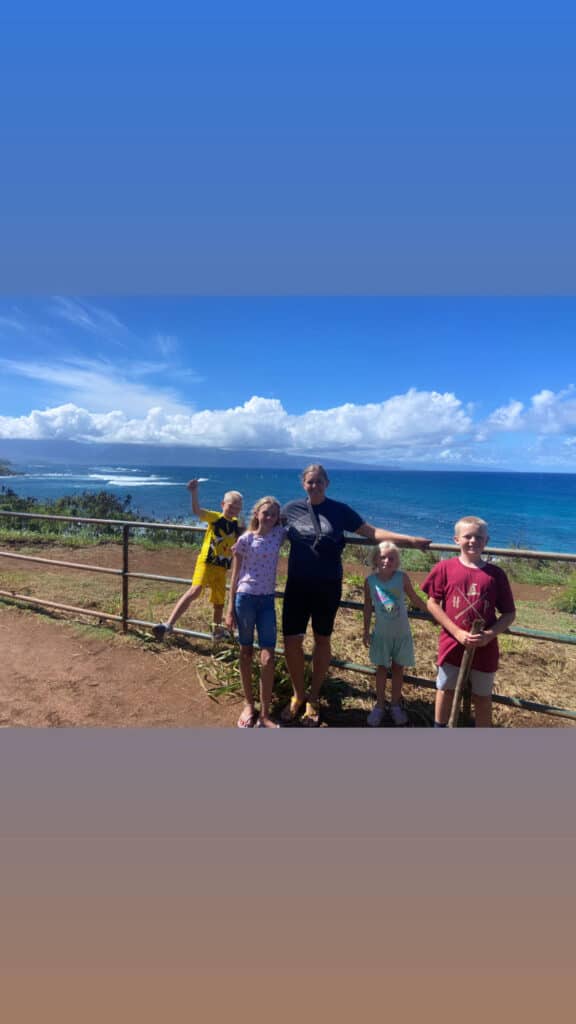
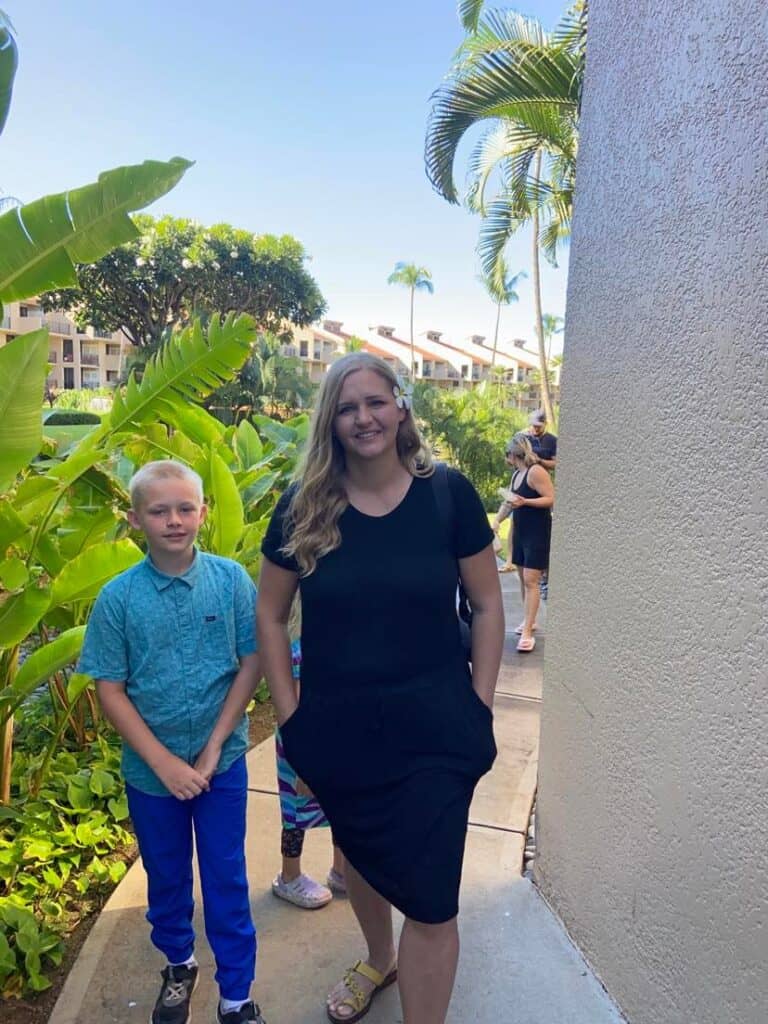
Lets recap with a face to face comparison.


That is what 60 pounds lost looks like on me. I am not a big side by side picture comparer, because I think sometimes that can equate weight loss to overall happiness, which I firmly believe is not the case. So I do try to avoid that.
I can honestly say I was happy with my life at plus 60 pounds and I am happy with my life at minus 60 pounds; However, I feel so much healthier and in control of how my body is functioning and metabolizing now versus before taking this medication. I was desperate to control my weight gain and lab results and this medication helped me drastically to achieve that.
Did I exercise and do things to help this weight come off?
The answer is yes. I walked or hiked regularly, usually 3 or more days a week and did between 5-7 miles each day. I also tried to stay active with my kids by taking them swimming, playing soccer and playing at the park, etc. and I occasionally swam laps. I did try to keep exercise to low impact workouts, which is a switch from my previous approaches that I have taken but I wanted to lower my cortisol levels that get elevated with PCOS.
Do I think you will loose weight while on this medication without exercising? Yes, I think you will loose weight with this medication regardless of physicals activity but I do think exercise increases the weight lost in a month.
What are the side effects?
Nausea
Because this medication is a G1 receptor drug and slows the rate that food empties from the stomach, it is going to cause some gastro-intestinal issues and nausea. So feeling nauseated is the number one side effect with this medication. Specifically the day after taking the weekly shot with it seems to peak at about 24 hours.
Constipation and Diarrhea
This medication can easily make you constipated and then another day it may give you diarrhea. The constipation can become much worse when you don’t get enough water. You will need lots of water with semaglutide because you are flushing out excess sugars and you need the water in your system to be able to do that or it can be hard on your kidney’s.
Make sure to get enough fiber as well. I also noticed that when I took ibuprofen I would get constipated, not sure if that was happening before taking this mediation but I definitely noticed it while taking it.
Fatigue, Weakness and Dizziness
Semaglutide makes me feel dizzy after I take my injections so I always do them at night where I can lay down after taking them. This wears off for me after a few hours.
This drug also makes me feel a little tired and a little weak at times. I find myself laying down much more than normal and I have to pick and choose which activities to do during the day so I can save my energy. As a do-er and someone always on the go, this is a new limitation I.ve had to put on myself.
As mentioned before I don’t seem to synthesize vitamin D very well and this medication does flush out vitamins D and B, which have direct effects on energy and muscle stamina so I found when I take these supplements regularly the weakness and fatigue lessen.
Headaches
Because semaglutide is a hormone, it is super common to get a headache from it. I get them every single time I do a shot for about a day after. Take headache medication, like ibuprofen and drink water to help manage it.
Feeling full even thought you want to eat more
It makes sense, if you want to loose weight then eat less, and that is the first premise of this medication. However, with my past of eating very little calories and not loosing weight, I know that eating too little can have negative effects. So I was determined to keep calories appropriate and not starve this weight off and come off of it malnourished. So this side effect could be annoying when I was hungry or saw food as a fuel for my body but couldn’t fully enjoy or eat what I know my body needed.
This can be a pro because it makes you more selective on what you choose to fuel your body with.
Feeling numb or depressed
This is a symptom listed on the medication box and I didn’t think it would effect me. However, I did notice that I felt a little depressed and numb when I first started taking this medication.
I went to Disneyland and really noticed it when I was on the Incredi-coaster, which is a fast paced rollercoaster that should raise some nerves and I realized I had no nerves at all. I was completely numb to the whole rollercoaster experience and even thought at the top of a drop that the cart could fly off the side of this right now and I would be fine with that, which is not like me. It honestly scared me. I love the nerves and stomach drops that normally come with rollercoasters. so this was really strange for me.
I realized that my emotions were really muted overall and I figured this was probably related to the vitamin D levels and vitamin B levels that I knew could drop on this medication and given my history with vitamin D deficits I knew this is a way my body manifests that deficiency.
With being on vacation and not taking my supplements and not having the best nutrition because of vacation, I had a theory that this numbness and depression was from that. So when we got home I began taking those supplements again and the numbness and depression lessened substantially and went away completely within a few weeks.
I am definitely not saying this will be the case for anyone else taking this medication or that if someone experiences these symptoms that they just need to watch nutrition and take supplement but for me that was my experience. The depression and numbness is something to be aware of and you should have a friend or family member who checks in on you or that you can talk to if you feel something is off. Definitely discuss it with your doctor or medical provider as well if you experience this symptom.
Gallbladder Issues
I did get gallstones while on this medication. They can happen from rapid weight loss and I felt them going into my 3 month on the medication. After a few weeks of pain, I called my doctor and he did lab work to make sure my liver and gallbladder were functioning well still.
My labs were good but I did have pain under my right rib, it felt like I had bruised my right rib somehow and felt tender under it. I also wasn’t digesting fats and all the fat I consumed would float on the top of the toilet water after going number 2. (TMI, sorry but if you have this you will understand).
What helped me is sitting in a really hot, hot tub. From my understanding, gallstones are made up of cholesterol, which is a fatty substance and from my understanding that melts when heated. This actually took away my pain and it never came back. So if you do get pain under your right rib, then check with your doctor for labs and use a heating pad, hot bath or hot tub and see if it helps.
Risk of Thyroid Cancer
You will most likely talk to your doctor about this side effect when they are prescribing you this medication. From what I understand, this only applies to people who have a rare thyroid cancer in their family history or are at risk for it. Most people won’t be at risk for developing this. Again, talk to your doctor about this if it is a concern.
Avoid getting pregnant on this medication
I did do some research when I first started taking this medication, on what would happen if you became pregnant while taking this medication. I don’t remember all of the details of that research, other than, it’s really not a good thing and to stop immediately if you become pregnant. Not a lot of testing has been done on it’s effects on a developing fetus from what I remember reading. So bottom line, avoid becoming pregnant while taking this medication. If you become pregnant, stop use immediately and contact your doctor.
Tips to not get sick after your shot:
Stay hydrated!
This is my top suggestion. The semaglutide shot always makes me sicker when I take it dehydrated. The sickest I have ever been on this shot was because I was extremely dehydrated when I took it. Your kidney’s will thank you for staying hydrated and it will help your digestion substantially. Also, be aware of soda (diet or regular) consumption, this dehydrates you and can cause extra gas in the intestines and seems to worsen the nausea and stomach discomfort when the shot is taken.
Eat easily digested food on the day of the shot.
For me, I noticed if I ate easily digestible foods on the day of the shot and the day after the shot then I would not get as sick. However, if I ate something harder to digest, like a lot of protein on those days then I would get really sick and my body wouldn’t be able to digest it, leading to throwing up and massive digestive issues.
No one wants to spend the night by the toilet, so just be conscious of the foods you eat the day of and after the shot. Staying hydrated will also help avoid hard and uncomfortable stools because they can easily happen on this medication.
Staying on a designated dose
I had quite the transition from the 1 mg pen to the 1.7 mg pen. I got really sick from it. So I decided to stay on the 1.7 for as long as I felt I needed to. My body did adjust to this amount and I didn’t get nearly as sick from it after the first month. I am going to increase to the 2.4 mg pen this next month and I am hoping I can handle it’s transition. I will keep you posted in another post. If it goes poorly then I will go back to the 1.7 mg. It hasn’t seemed to impact my weight loss in a negative way by staying on the lower dose.
Overall tips for this medication:
Free nutrition coaching is available.
The pharmaceutical companies that make Wegovy and Ozempic offer personal health coaching for free. You can sign up for this on their websites. I did this for a few weeks when I started because I wanted to see what they had to offer. I have a pretty good education and understanding of nutrition from studying it in college and years of learning about it for managing my PCOS but wanted to see what the offered coaching was like.
They have you set weekly goals on diet, exercise and overall health and then follow up with you during the week to encourage you or give you tips to succeed. This nutrition coaching can be done as little or as long as you want to do it. It is meant to help you build healthy habits that will extend the results of this medication after you have stopped taking it and for the rest of your life.
My coach was encouraging and she started out with very basic nutrition knowledge because she doesn’t know where her clients are at on that knowledge level. However, she adapted to my level and was helpful in keeping me motivated and encouraged. So I would recommend it.
Learn and focus on nutrition
It can be hard to eat nutritiously when you feel nauseated, so try to find nutritious foods that work well for you. I personally love sweet potatoes or roasted vegetables so I found meal prepping these ahead of time was helpful when I needed to eat but couldn’t stomach heavy protein or fats. I also found protein shakes to be beneficial.
Plan on healthy snacks, It you are always snacking on sugary or highly processed things then this medication will work less effectively. Not saying that you need to cut out sugar or processed foods, I am not saying that, but be aware that it will help this medication work it’s best.
Eat protein and healthy fats (when you’re not feeling nauseated), you will feel fuller quicker and it will last longer and will give you better results from this medication.
Get a support network
Because this medication did make me feel sick and nauseated, having a support system that knew and understood how I was feeling was crucial for me. I felt like I had to lay down and rest much more than I normally do and it was helpful to have a spouse, children and friends who understood that. Not saying they didn’t loose patience with me on occasion but they did know that it was this medication and not just me being lazy or wanting attention.
If you don’t feel like you have support from friends and family, then I would rely on that coaching service provided by the pharmaceutical company so you have someone to talk to about it and encourage you.
Medication Shortages:
I did run into medication shortages while taking this medication. I hope that these shortages come to an end soon, It is my understanding that they should. However, If you are having trouble getting the medication, I would suggest calling all the pharmacies in your town and seeing if they have any in stock. I had to drive to another town to get a medication more than once. Walgreens can check pharmacies supplies all over the state so that was helpful. You can also stay on a medication dosing that may be in stock until they have the higher dose available to you.
In conclusion
To wrap up this post, I want to say that this mediation has been an overall great experience for me. I have seen really great benefits to my overall health from taking it and those benefits far outweigh the negative side effects.
If you can relate to my weight loss journey or have PCOS, I would suggest talking to your doctor about this medication because it can be life changing. Thank you for reading and I hope this post was helpful. I hope to do another post after I stop taking this medication with final results and then another one to show results after being off this mediation for a few months.